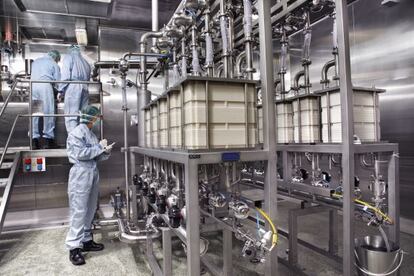The Spanish biotech company bucking the stock exchange trend
Grifols' share price rose 89 percent over the last year, while the Ibex lost 31 percent

One of the few success stories to be found in recent months among the Ibex 35 index of leading Spanish companies is Barcelona-based biotech company Grifols.
Grifols reported an almost seven-fold rise in first-half net profit, boosted by a strong performance across regions and business divisions and its acquisition of US peer Talecris last June.
The world's third-largest blood products maker saw net profits of 134 million euros in the first six months of 2012, compared with the analysts' forecast of 135 million euros.
"The main growth driver continues to be sales volumes, even if in general terms prices remain stable, with a slight upturn in some products derived from blood plasma," says Grifols' finance director and head of investor relations, Nuria Pascual.
Grifols' share price had risen 89 percent over the last year, while the Ibex tumbled 31 percent, making Grifols the best-performing stock. Biggest loser Bankia has shed almost 80 percent in the same period.
Grifols is now a market leader in the United States after its $4-billion takeover of Talecris Biotherapeutics won approval from US antitrust regulators earlier this year. The company reported revenues of 1.3 billion euros, up 15 percent from a year earlier and matching the prediction of analysts.
The deal - which was announced by Grifols a year ago - was closed in July, and officials expect to begin the process of combining the two companies shortly.
"We always knew that we could do it," says Pascual. "We knew that the purchase of Talecris would involve incurring serious debt, but we have already managed to reduce that. We have been amortizing the debt well ahead of schedule. In January we were even able to reorganize our debt, revising the interest rates, and the financial margins," she says, adding that the company expects to be able to return to debt levels prior to the purchase of Talecris within four years.
We are a global company: Spain makes up a small part of our sales"
Barcelona-based Grifols generated more than 90 percent of its profits outside its home market, and has benefited from its $4-billion acquisition of US peer Talecris last year, which it says will lead to $300 million in annual operating synergies from 2015.
Grifols and Talecris use blood plasma to make medicines, which are used to treat a wide range of diseases, including hemophilia and various immune system deficiencies.
Analysts agree that the Talecris purchase was well timed and provides important synergies. "This will provide important growth in the United States, with good complementation in other markets. There is a little bit of overlapping, but Grifols now has a huge presence in the North American market and in countries such as Germany. There are considerable synergies," says Iván Sanfélix of Renta 4. Grifols had to let go of some of its shares to meet competition regulations, but it has been able to hold on to its core production centers and add others.
Only 13 percent of revenues were generated in Greece, Spain, Italy and Portugal, the countries at the heart of the euro zone crisis, where some pharmaceutical companies have complained of unpaid bills.
The company said it would continue to focus on regions that show promising growth, such as Latin America, shielding it from the worst of the economic slump that has left one in four of the active population jobless in Spain.
"We are a global company: the Spanish market makes up a small part of our sales, and its share will continue to decline; nevertheless, our production base is here in Spain. In the United States we have hundreds of blood extraction centers," says Pascual.
"Obviously, having a big market share overseas will help. They are not associated with Spain, or with Spain's economic problems, and the country hardly figures in its accounts. Furthermore, Grifols is part of a market that has proved itself to be stable. This would be a stable position to take for investors," says Ignacio Cantos, an analyst at ATL Capital.
Like other analysts, Cantos draws parallels with fashion retailer Inditex. "Like Inditex, Grifols has always met investors' expectations - at least for the moment. They said that there would be synergies with Talecris, and there were." Manuel Sousa Andrade, an analyst at Saxobank says that Grifols has more to offer than a refuge from the ongoing financial storm: "It is a defensive company, but it is proving that the reason its value has risen is because it has good results," he says.
The continued high expectations that investors are placing in Grifols could come tumbling down, warn analysts, if the company hits problems. Shares on the Ibex are currently trading at high prices.
All eyes are on them to see just how high they can go before they start to fall. Investors are looking for a sign to sell and avoid being stuck with overpriced shares.
"It is hard to see the share value going above 26 euros. We have set our top price at 22.54 euros - we would need more information to back an increase above that," says Andrade of Saxobank. Ivan Sanfélix of Renta 4 warns that Grifols' anti-cyclical nature could work against it if the market takes an upturn: "The margin for improvement is pretty much exhausted. When investors return to the market, Grifols may be affected, because it too is linked to the way the economy is behaving," he says.
Tu suscripción se está usando en otro dispositivo
¿Quieres añadir otro usuario a tu suscripción?
Si continúas leyendo en este dispositivo, no se podrá leer en el otro.
FlechaTu suscripción se está usando en otro dispositivo y solo puedes acceder a EL PAÍS desde un dispositivo a la vez.
Si quieres compartir tu cuenta, cambia tu suscripción a la modalidad Premium, así podrás añadir otro usuario. Cada uno accederá con su propia cuenta de email, lo que os permitirá personalizar vuestra experiencia en EL PAÍS.
¿Tienes una suscripción de empresa? Accede aquí para contratar más cuentas.
En el caso de no saber quién está usando tu cuenta, te recomendamos cambiar tu contraseña aquí.
Si decides continuar compartiendo tu cuenta, este mensaje se mostrará en tu dispositivo y en el de la otra persona que está usando tu cuenta de forma indefinida, afectando a tu experiencia de lectura. Puedes consultar aquí los términos y condiciones de la suscripción digital.









































